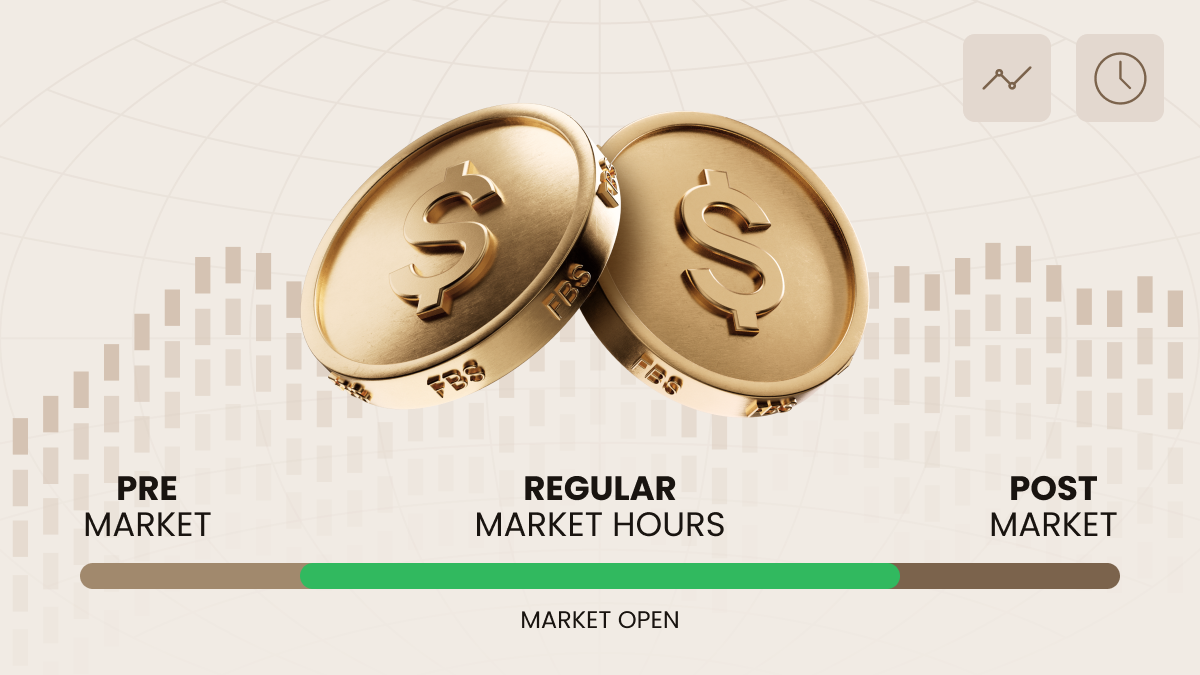
أتمنى أن يكون كل الأصول مثل العملات الرقمية، ليس لأن العملة الرقمية قد تقفز بنسبة 100% في اليوم وتنحدر بعد ذلك مباشرة بمقدار نصف النمو (الأمر مضحك). للأسف، فإن الشيء المذهل الذي لا تتميز به الأصول العادية هو التداول 24\7. إن معظم أدوات الفوركس متاحة للتداول 24\5، ولكن ماذا عن الأسهم؟ هل هي متاحة للتداول عدة ساعات في اليوم فقط؟ حسناً، نعم ولا، ولكن بالمجمل كلا ليست متاحة. ستتعرفون في هذه المقالة عن التداول قبل الفتح وبعد الإغلاق:
- ما هو؟
- من يستطيع استخدامه؟
- هل هو أفضل بشكل ما من التداول التقليدي؟
- والعديد من النقاط الأخرى!
ما هو التداول بعد الإغلاق؟
يجري التداول بعد الإغلاق بعد انتهاء ساعات العمل في البورصة، ويسمح لك بشراء أو بيع الأسهم خارج ساعات التداول العادية، ويدعى أيضاً جلسة تداول ممددة.
ويعمل تداول قبل الفتح وبعد الإغلاق بنفس طريقة عمل السوق العادية، حيث يتم تداول الأسهم بين الأطراف بسعر متفق عليه. أي بمعنى آخر، السعر الذي ستحصل عليه هو السعر الذي يرغب شخص ما في سوق بعد اللإغلاق أو قبل الفتح في دفعه.
يتيح التداول بعد الإغلاق للمستثمرين التفاعل مع إصدارات أرباح الشركة والأخبار الأخرى التي تحدث عادة قبل أو بعد ساعات التداول العادية. على سبيل المثال، يمكن أن تتأرجح الأسعار بشكل كبير مع بيان الأرباح أو الأخبار التي تفيد باستقالة الرئيس التنفيذي، لذلك إذا كنت ترغب في الشراء أو البيع في أقرب وقت ممكن بناءاً على الأخبار، فستحتاج إلى تقديم طلب للتداول بعد الإغلاق.
أوقات التداول بعد الإغلاق
هناك جلستان للتداول الممدد:
- يمتد التداول قبل الفتح من الساعة 04:00 حتى 9:30 بالتوقيت الشرقي.
- يمتد دوام التداول العادي للسوق من الساعة 9:30 حتى الساعة 16:00 بالتوقيت الشرقي.
- يمتد التداول بعد الإغلاق من الساعة 16:00 حتى 20:00 بالتوقيت الشرقي.
لا يتيح كافة وسطاء التداول الوصول لتداول قبل الفتح وبعد الإغلاق. ولا يسمح لك كافة الوسطاء بالتداول في جميع ساعات قبل الفتح وبعد الإغلاق. مثلاً، قد يمنحك بعض الوسطاء فرصة التداول لمدة ساعة فقط قبل فتح السوق وبعد إغلاقه. تختلف الشروط وتعتمد على القوانين (ورغبة السماسرة في فعل ما يريدون).
من بوسعه أن يتداول بعد الإغلاق؟
بدأ التداول بعد الإغلاق عام 1999 تقريباً، في ذلك الوقت، قدمت معظم البورصات شبكات اتصالات الكترونية (ECNs – شبكات الكترونية تعمل على الكمبيوتر لتسهيل تداول المنتجات المالية خارج البورصات التقليدية). مع ECN، لا يحتاج المتداولون والمستثمرون التواجد في مبنى البورصة كي يضعوا صفقاتهم.
في وقتنا هذا، يستخدم معظم المشاركين في السوق جلسات تداول ممددة للتفاعل مع الأخبار بشكل أسرع من الآخرين، ومن هذه الأخبار:
- تقارير الأرباح.
- تغيير التصنيف (عادة، تكشف البنوك الكبرى ووكالات التصنيف عن تقديراتها قبل فتح السوق).
- الأحداث المفاجئة.
ما يسعنا قوله بالتأكيد هو أن التداول قبل الإغلاق وبعد الفتح متاح فقط لمتداولي الأسهم ومع وسطاء معينين فقط، ويقدم وسطاء العقود مقابل الفروقات (CFD) هذا الخيار في كثير من الأحيان بسبب إجراءات التنظيم والسلامة.
أما بالنسبة للاعبين الكبار، تعتبر الجلسة الممددة وقت مثالي للتحرك لأصحاب رؤوس المال المحنكين. على سبيل المثال، غالباً ما يستخدم كل من المطلعين وصناديق التحوط أوقات التداول قبل الفتح وبعد الإغلاق للوفاء بأوامرهم عبر ما يسمى بالصناديق المظلمة (بورصة منظمة بشكل خاص لتداول الأوراق المالية). تتيح الصناديق المظلمة للمستثمرين المؤسسيين بالتداول دون الكشف حتى بعد تنفيذ الصفقة والإبلاغ عنها.
مخاطر التداول بعد الإغلاق
نظراً لوجود عدد أقل من المشاركين مقارنة بساعات التداول العادية، فإن الأسواق قبل الفتح وبعد الإغلاق ستشهد عموماً سيولة وحجماً أقل وتقلباً أكبر.1 يمكن أن يؤثر هذا بشكل كبير على السعر الذي يحصل عليه المشتري أو البائع في النهاية مقابل أسهمه، لذلك من الحكمة استخدام أمر تحديد على أي أسهم يتم شراؤها أو بيعها خارج ساعات التداول العادية.
سيكون من المفيد الانتباه أيضاً لمخاطر التسعير. تستخدم المؤسسات المالية المختلفة شبكات ECN متعددة لتنفيذ التداولات. يتم تنفيذ طلبك بأفضل سعر متاح من مصادر متعددة خلال جلسة تداول عادية. ولكن في جلسة ممددة، يتم تقييدك بواسطة وسيط واحد فقط، وبالتالي قد يكون السعر أسوأ من أسعار المصادر الأخرى. ومع ذلك، قد يصبح هذا السبريد بين الوسطاء فرصة لتداول المراجحة، سنعرف المزيد عن ذلك لاحقاً.
الطبع، يشمل التداول بعد الإغلاق عدداً أقل من المشاركين في السوق. وبالتالي، يتم وضع عدد أقل من الطلبات في جدول عمق السوق. عندما يحاول الجميع التفاعل بالرد على خبر ما دفعة واحدة، سيتم تداول السهم بعنف في جلسة ما بعد الإغلاق حيث يعمل السوق على استيعاب الأخبار واكتشاف سعر جديد للورقة المالية، نتيجة لذلك، قد يكون من الصعب على مستثمري التجزئة تنفيذ أمر بالسعر المختار. علاوة على ذلك، قد تتمكن من الحصول على سعر أفضل في جلسة التداول العادية في اليوم التالي.
فوائد التداول بعد الإغلاق
أولاً، توفر لك الجلسات الممتدة إمكانية تداول الأخبار قبل الآخرين، إذ يمكن لعمليات الاستحواذ والاندماج والإيداع الإفلاس وتقارير الحكومة عن البطالة والأحداث الأخرى تحريك الأسهم قبل (أو بعد) جرس الافتتاح. بعد ذلك، ما عليك سوى التحرك بسرعة لاستغلال هذه الحركة.
لا تنسَ المراجحة أيضاً، وهو أسلوب تداول يتضمن البحث عن اختلاف في الأسعار على نفس الأصل لدى وسطاء مختلفين. عادة، تميل الأسعار إلى التوافق (لأنه نفس الأصل، فلماذا تتباعد؟). يحب متداولو المراجحة الجلسات الممددة لأنها الحالة الوحيدة في سوق الأسهم التي يمكن أن توجد فيها المراجحة لأكثر من جزء من الثانية.
خلاصة القول، يملك تداول قبل الفتح وبعد الإغلاق إيجابيات وسلبيات. فعندما تملك الفهم الكافي للجلسات الممتدة وكيفية استخدامها ستحظى بفرص جديدة للتداول، ولكن عليك ألا تغفل عن المخاطر. تداول بأمان، حظاً موفقاً!